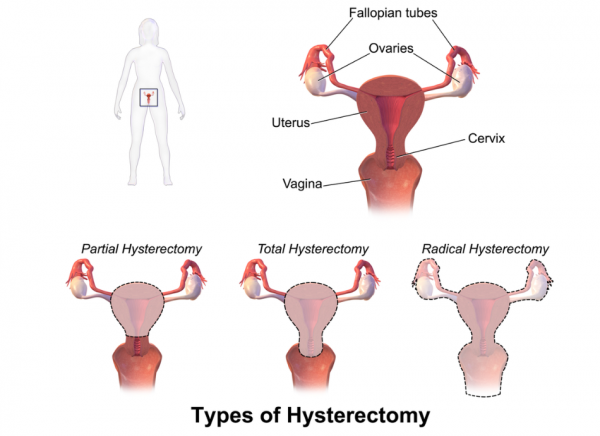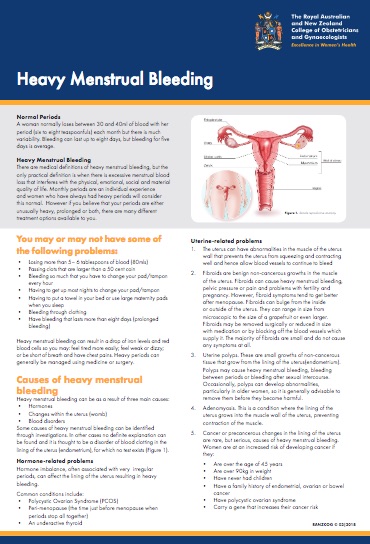You can now add Healthify as a preferred source on Google. Click here to see us when you search Google.
Hysterectomy | Tangohanga kōpū
Key points about hysterectomy
- A hysterectomy (tangohanga kōpū) is an operation to remove your uterus (womb).
- It's done to treat conditions that affect the female reproductive system, including bleeding problems, endometriosis, uterine fibroids, prolapse or cancer.
- In most cases, a hysterectomy is only done when other treatments have been tried and are not working.
- After a hysterectomy, you will no longer be able to get pregnant and you will no longer have periods.
- Your ovaries and/or fallopian tubes may also be removed in a hysterectomy.

A hysterectomy (tangohanga kōpū) is an operation to remove your uterus (womb). It's done to treat conditions that affect the female reproductive system, including bleeding problems, endometriosis, uterine fibroids, prolapse or cancer.
In most cases, a hysterectomy is only done when other treatments have been tried and aren't working.
After a hysterectomy, you'll no longer be able to get pregnant and you'll no longer have periods. Your ovaries and/or fallopian tubes may also be removed in a hysterectomy.
These are the most common reasons for a hysterectomy:
- Abnormal vaginal bleeding that's not controlled by other treatment methods.
- Adenomyosis, when tissue that normally lines the uterus (endometrial tissue) grows into the muscular wall of the uterus, causing heavy and painful periods.
- Uterine fibroids (benign tumours) that have grown, are painful or are causing bleeding.
- Long-term severe pelvic pain related to your uterus but not controlled by other treatment.
- Uterine prolapse(external link) (when your uterus ‘drops’ into your vaginal canal due to weakened support muscles). This can lead to urinary incontinence (wetting yourself) or difficulty with bowel movements (pooing).
- Cervical or uterine cancer, or abnormalities that may lead to cancer.
- A hysterectomy may also be relevant for some transgender men and non-binary people, including those assigned female at birth (AFAB).
Many of these issues can be treated without a hysterectomy. In most cases, a hysterectomy is only done when other treatments are not working.
Depending on the reason for the surgery, all or only part of your uterus (womb) may be removed. Talk with your surgeon to work out the best option for you.
These are the main types of hysterectomy:
- Subtotal (or partial) hysterectomy – where the main part of your uterus is removed, but the lower part of your uterus, called the cervix is left behind.
- Total hysterectomy – where all of your uterus is removed, including your cervix.
- Extended (or radical) hysterectomy – where your uterus and the tissue around your uterus is removed. Usually your ovaries and fallopian tubes will also be removed during this operation (but not necessarily). Sometimes part of your bladder or bowel may also need to be removed. The most common reason for this operation is when you have cancer of your cervix, uterus or ovaries.

Image credit: Bruce Blaus Wikimedia Commons
There are several different ways that a hysterectomy can be performed.
Abdominal hysterectomy
A hysterectomy can be performed through a cut in your lower abdomen (tummy). This is usually a sideways cut just above your pubic bone, like a caesarean section scar. Sometimes a vertical cut from your pubic bone to your tummy button is needed.
- The main advantage of this operation is that it is easier to see your uterus and the nearby organs such as your fallopian tubes and ovaries, which sometimes need to be removed during the operation.
- The main disadvantage is that the cut or incision takes about 4 to 6 weeks to heal.
Vaginal hysterectomy
A hysterectomy can also be performed through your vagina.
- This operation is not suitable for everyone, especially if you have not had any children or if your uterus is very big.
- This operation can be slightly more difficult than an abdominal hysterectomy but the recovery is much faster.
vNOTES
vNOTES (vaginal natural orifice transluminal endoscopic surgery) is a specific type of vaginal hysterectomy.
- This operation combines the vaginal and laparoscopic techniques.
- A small incision is made in your vagina and a vNOTES device is placed in to allow the surgeon to see and access your uterus, fallopian tubes and ovaries.
- A camera and specialised instruments are inserted through the device for the operation. Afterwards they are all removed and the incision is closed.
- You may be discharged on the same day and recovery can be quicker and less painful than with other hysterectomy techniques.
- It's available in some public and private hospitals in Aotearoa New Zealand.
Laparoscopic hysterectomy
- A laparoscopy is a procedure where a telescope, also called a laparoscope, and operating instruments are inserted through 3 or 4 small cuts in your abdominal wall and your uterus is removed using these instruments.
- Often the upper part of your uterus is removed using the laparoscope and a vaginal hysterectomy is performed to remove the lower part. This is called a laparoscopic-assisted vaginal hysterectomy.
- A laparoscopic hysterectomy is easier to recover from, mainly because there are a few small cuts instead of one bigger cut.
- The operation does take longer than an abdominal hysterectomy and is usually performed by surgeons who specialise in laparoscopic surgery.
All operations carry some risk. Talk to your surgeon so you understand what's involved and are aware of any complications you may face. The following are some possible complications.
Bleeding and infection
Any operation that involves cutting has the risk of bleeding or infection. The possibility of needing a blood transfusion will be discussed with you before the operation. Antibiotics are often used at the beginning of the operation to decrease the chances of an infection afterwards.
Anaesthetic complications
Modern anaesthetics are very safe. Although it's rare, some people can have reactions to the anaesthetic medicines. Before your operation, it's likely you'll have an appointment with the anaesthetist who will be looking after you during the surgery. They will discuss the type of anaesthesia you will be receiving and the risks associated with this.
Damage to surrounding organs
Your uterus is surrounded by other organs, which need to be gently pushed aside so the surgeon can operate. Endometriosis, infection and cancer can cause your bladder or bowel to become stuck to your uterus, ovaries or fallopian tubes. The surgeon needs to be very careful in these situations to make sure these organs are not damaged. The chance of problems like this happening in other situations is very low.
After the operation
You will usually stay in hospital for 2–4 days and go home only after your bladder and bowels are working properly and any pain is managed.
When you get home, it can be easy to overdo things, so it's important to rest as much as possible. Resting also decreases the chance of getting an infection in your wound.
You shouldn't drive for at least 24 hours after an anaesthetic. Some insurance companies won't let you drive for 4–6 weeks after an abdominal hysterectomy. Others may require your healthcare provider to say you are okay to drive. To drive safely you need to be able to sit in the car comfortably, make an emergency stop, wear your seatbelt and look over your shoulder to park.
If you have stitches, these will usually stay in place for about a week.
Avoid having sexual intercourse for about 4–6 weeks to allow the scar inside to heal properly. It's also important not to put anything in your vagina during this time - including a penis, fingers, sex toys, tampons, or douches. If sex is still uncomfortable after a couple of months, talk to your healthcare provider.
When you go home you will usually be given written instructions about who to call if you are worried. Most hospitals will have this information in different languages, so remember to ask if reading English is difficult for you.
These are some of the things to look out for:
- Feeling hot and cold, or feeling like you have the flu. This can mean an infection somewhere.
- Burning or stinging when you pee, or only peeing a little bit, means you could have a bladder infection.
- Increasing vaginal bleeding or a smelly discharge can be due to an infection at the top of your vagina, where your uterus has been removed.
- A red, painful or swollen scar may be due to a wound infection.
- Pain inside your tummy or loss of appetite or vomiting (being sick) could be due to a problem with your bladder or bowel.
- Painful or swollen legs may be due to a blood clot in your legs. This is uncommon but serious and you should call your healthcare provider immediately.
- Remember if something doesn't seem right but you're not sure, call your healthcare provider or the hospital.
A bit of planning can be very useful.
Before the operation
- If you smoke, get support to stop for as long as you can before the operation.
- If your BMI is >35, it's recommended to try and lose weight before surgery. This will decrease your risk of complications including blood clots and wound infections.
- If you have health conditions such as diabetes or heart disease, try to have these under good control before the operation.
- Learn about your operation. If there's anything you don't understand, ask your healthcare provider to explain it more clearly.
After the operation
- Arrange for your friends and family/whānau to help if they can.
- Don't plan to do too much afterwards – you must give your body a chance to heal.
Apps reviewed by Healthify
Information for you after an abdominal hysterectomy(external link) Royal College of Obstetricians and Gynaecologists
Information for you after a vaginal hysterectomy(external link) Royal College of Obstetricians and Gynaecologists
Apps
Brochures
Hysterectomy(external link) RANZCOG, Australia, 2018
Heavy Menstrual Bleeding(external link) RANZCOG, Australia, 2018
References
- Bretschneider CE, Jallad K, Paraiso MFR. Minimally invasive hysterectomy for benign indications – an update(external link) Minerva Ginecol. 2017;69(3): 295-303
- Zigras T, Lennox G, Willows K, Covens A. (2017). Early cervical cancer – current dilemmas of staging and surgery(external link) Curr Oncol Rep.2017;19(8):51
- Ayeleke RO, Mourad S, Marjoribanks J, Calis K A, Jordan V. Antibiotic prophylaxis for elective hysterectomy(external link) Cochrane Database of Systematic Reviews 2017
- Hysterectomy(external link) American College of Obstetricians and Gynecologists, US, 2021
- Gynaecological surgery in the obese woman(external link) American College of Obstetricians and Gynaecologists, January 2015
- vNOTES(external link) Applied Medical, US

Hysterectomy
RANZCOG, Australia, 2018

Heavy Menstrual Bleeding
RANZCOG, Australia, 2018
Credits: Healthify editorial team. Healthify is brought to you by Health Navigator Charitable Trust.
Reviewed by: Dr Phoebe Hunt, Medical Officer, Northland.
Last reviewed:
Page last updated:





